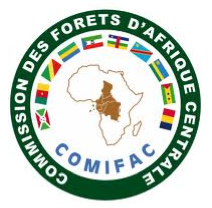The Executive Secretariat of the Central African Forest Commission (COMIFAC) hosted a sub-regional workshop to strengthen the capacities of the Climate Working Group and prepare for the 19th session of the Conference of the Parties (COP 19) to the UN Framework Convention on Climate Change (UNFCCC), scheduled to take place from 11-22 November 2013, in Warsaw, Poland.
 19 September 2013: The Executive Secretariat of the Central African Forest Commission (COMIFAC) hosted a sub-regional workshop to strengthen the capacities of the Climate Working Group and prepare for the 19th session of the Conference of the Parties (COP 19) to the UN Framework Convention on Climate Change (UNFCCC), scheduled to take place from 11-22 November 2013, in Warsaw, Poland.
19 September 2013: The Executive Secretariat of the Central African Forest Commission (COMIFAC) hosted a sub-regional workshop to strengthen the capacities of the Climate Working Group and prepare for the 19th session of the Conference of the Parties (COP 19) to the UN Framework Convention on Climate Change (UNFCCC), scheduled to take place from 11-22 November 2013, in Warsaw, Poland.
Hosted by the COMIFAC Executive Secretariat in collaboration with its development partners, namely the Global Environment Facility (GEF)/World Bank through the Regional REDD+ Project, the German Technical Cooperation (GIZ), the International Union for Conservation of Nature (IUCN) and the World Wide Fund for Nature (WWF), the workshop took place in Douala, Cameroon, from 16-19 September 2013, and brought together all the climate/REDD focal points in Central Africa.
The main objective of the workshop was to enhance understanding of the stakes of negotiations underway under the UNFCCC in order to prepare for COP 19. Participants discussed and endorsed the views submitted by the COMIFAC countries on the 2015 agreement that is under negotiation. These views will be forwarded to the Convention Secretariat by the Acting chair of COMIFAC. In the submission, the Congo Basin countries address the legal form of the 2015 agreement, mitigation, adaptation, finance, and technology transfer and capacity building.
On the 2015 agreement, the COMIFAC countries support the adoption of a new protocol under the Convention in accordance with its principles, and that establishes the level of mitigation ambition in order to keep temperature rise to 1.5 degrees Celsius by 2100. They further note that the new agreement should recognize and value the contribution of forest ecosystems to climate change mitigation. COMIFAC countries oppose that the agreement be focused solely on mitigation, and call for taking into account all the elements of paragraph 5 of Decision 1/CP 17 of Durban, namely: mitigation; adaptation; finance; technology transfer; transparency of measures and support; and capacity building.
On mitigation, COMIFAC countries recall the finding of the Intergovernmental Panel on Climate Change (IPCC) that the potential of reducing emissions from deforestation is around 15-30% of greenhouse gas emissions (GHG), noting the need for further investments in sustainable forest management (SFM).
On adaptation, they underscore that it remains a priority for the region, stressing that recent studies indicate that the COMIFAC countries are vulnerable to the impacts of climate change.
On finance, they call for increased, additional, predictable and adequate finance from public and private sources to be made available to developing countries. They add that financial commitments of developed countries must come primarily from public sources, to be completed by private sources. COMIFAC countries also emphasize that the financial mechanism to be set up must be clearly defined and transparent to allow the management of predictable, stable and sufficient funds to support activities related to conservation, SFM, and the protection of forest ecosystems.
On technology transfer and capacity building, they underline its importance in order to support climate change mitigation and adaptation, stressing that the 2015 agreement should ensure that technology transfer and capacity building be effective and address the needs identified by the developing countries themselves.
The workshop was attended by representatives from: Burundi, Cameroun, Congo, Gabon, Equatorial Guinea, the Central African Republic, the Democratic Republic of Congo (DRC), Rwanda, Sao Tomé and Principe, and Chad. [Congo Basin Forest Partnership Press Release]